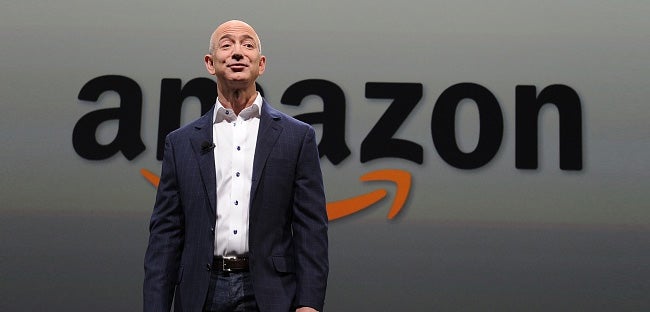RUSH: This is a sign of desperation. Seattle, Washington, has decided to pull back from its massive head tax after Amazon and Starbucks threaten to leave the city. Now, if you hadn’t heard about this, this is the way Seattle had decided to deal with its homeless problem, which is major and growing. The mayor, Jenny Durkan and the city council said they would consider legislation to repeal a head tax on the city’s large businesses just weeks after the whole thing was passed and drew criticism from Amazon, Starbucks, and a bunch of other large companies. It was backed by the mayor and seven of the nine members of the Seattle city council. The repeal effort is underway despite the tax’s unanimous passage by the council on May 14th.

The people haven’t voted for this. This is the council. And here’s the deal. The approved version of Seattle’s head tax had called for large employers to contribute $275 per employee annually above every other tax they pay, in addition to, in an effort to raise $50 million per year toward efforts to address the growing homelessness crisis. This amount of money would not have made a dent in the entire homeless problem in Seattle.
So what would have happened, they would have raised this tax of $275 per employee. Now, what do you think that tax would do? A, it would limit the amount of raises that there were for the employees, and it would raise prices on whatever services and product these companies are engaged in. Because they’re not gonna end up paying this. They’re gonna find a way for their customers or their employees to pay it. But $50 million would not have been nearly enough. The city council would have then said, “You know what? We need to raise this to $500 per head.”
It was the beginning a brand-new tax, it would never be the end of it, it would only be the beginning of it, and all of these left-wing CEOs like Bezos and this guy, what’s his name from Starbucks, actually stood up and said “no.” Amazon’s in the midst of massive construction. It’s their headquarter city. They threatened to stop it all dead in its tracks. So the city has backtracked, for now. But this is a government. And, remember, a government will find a wormy, slinky way to get this money. And they’ll do it in a much less public way down the road.
Ladies and gentlemen, I’ve detected something happening on the internet. This is not about net neutrality, although what’s amazing about net neutrality is that it’s even an issue. And the reason it’s an issue is because of these little leftists in Silicon Valley.
Net neutrality is nothing more than the government regulating it as a utility. They want the internet regulated the same way the old Bell Telephone company was regulated back in the 20’s and 30’s. That’s what net neutrality essentially was, was turning it into a utility, the internet, and let the government control it.
And, of course, leftists want the government to control everything because they use government to punish their enemies. And so they were all in favor of it. The truth of the matter is, net neutrality did not happen until three years ago. The internet grew. The internet prospered. The internet spiraled upward and made many people wealthy with no government control whatsoever, long before net neutrality.
The very idea of an open and free and unbridled internet was the way it was from the beginning! And these people are acting like they’re scared to death to go back to that. These leftists in Silicon Valley, including these social media companies, have managed to pull off a brilliant PR spin or scam here. They have got a bunch of young skulls full of mush in tech journalism and elsewhere really believing this silly, outrageous idea that the survival of the internet hinges on a rule that didn’t even exist three years ago.
They think the internet is gonna come crashing down and end up being impossibly expensive unless net neutrality is restored, which it won’t be and it officially ended yesterday. But it’s amazing. A return to the days of a free and open and expanding, wealth creating internet, they oppose it. Well, in light of that, there’s something else happening.
 You know me. I study cultural and societal trends. And many young leftists celebrated the internet, the free speech aspects, the openness of it. And they relished the limitless exposure people had to engage in politics. And when the internet and social media developed as a giant tool against conservatism, they embraced it, and they loved it. When they figured out that they could use Facebook and Twitter and any number of other social media to punish and to diminish and to attack Christians and conservatives, they were all excited about it.
You know me. I study cultural and societal trends. And many young leftists celebrated the internet, the free speech aspects, the openness of it. And they relished the limitless exposure people had to engage in politics. And when the internet and social media developed as a giant tool against conservatism, they embraced it, and they loved it. When they figured out that they could use Facebook and Twitter and any number of other social media to punish and to diminish and to attack Christians and conservatives, they were all excited about it.
But now, ladies and gentlemen, I want to let you know that we’re on the cusp of a bunch of these enlightened young tech journalists having second thoughts. And the reason is that there’s too much radical kookiness out there for them. And so now a bunch of tech people are questioning whether it’s a good idea to have a free and open internet.
The reason they’re worried is that before the internet, there were kooks, there were wackos, in these people’s views. The Alt-Right was always there. But the Alt-Right, nobody knew who it was, because the Alt-Right never had a way of popular mass expression. So the Alt-Right was properly seen as an obscure bunch of nutcase kooks that basically were invisible and therefore presented no threat.
But now the internet is there, and the Alt-Right, they have their own social media, and they have their own websites, and they have their own ability to communicate to mass audiences and grow, and therefore the internet is seen as a problem, because it has enabled these kook fringe elements to become mainstream. And this may not be acceptable.
Young tech journalists and other Silicon Valley leftists — by the way, Silicon Valley’s bias — I just want to let you in on something else. Everybody thinks Silicon Valley is biased against conservatives — tech media, social media, biased against conservatives.
Yeah, but it’s more than that. If you drill down and if you dug deep, what you would find is that atheism and no religion whatsoever is the dominant cultural belief in progressive tech communities. It is fear of religion, particularly Christianity, that is the root of the bias.
Now, they figure most religious people, most Christians are conservative, so to them it’s hand in hand. But it’s not so much a bias against conservatism as it is a bias and fear of religious people. That’s why Google, that’s why all these other big, gigantic tech companies who have a dominant culture of atheism or agnosticism, it’s fear of religion and the morality and the limits that exist there that cause the real bias.


